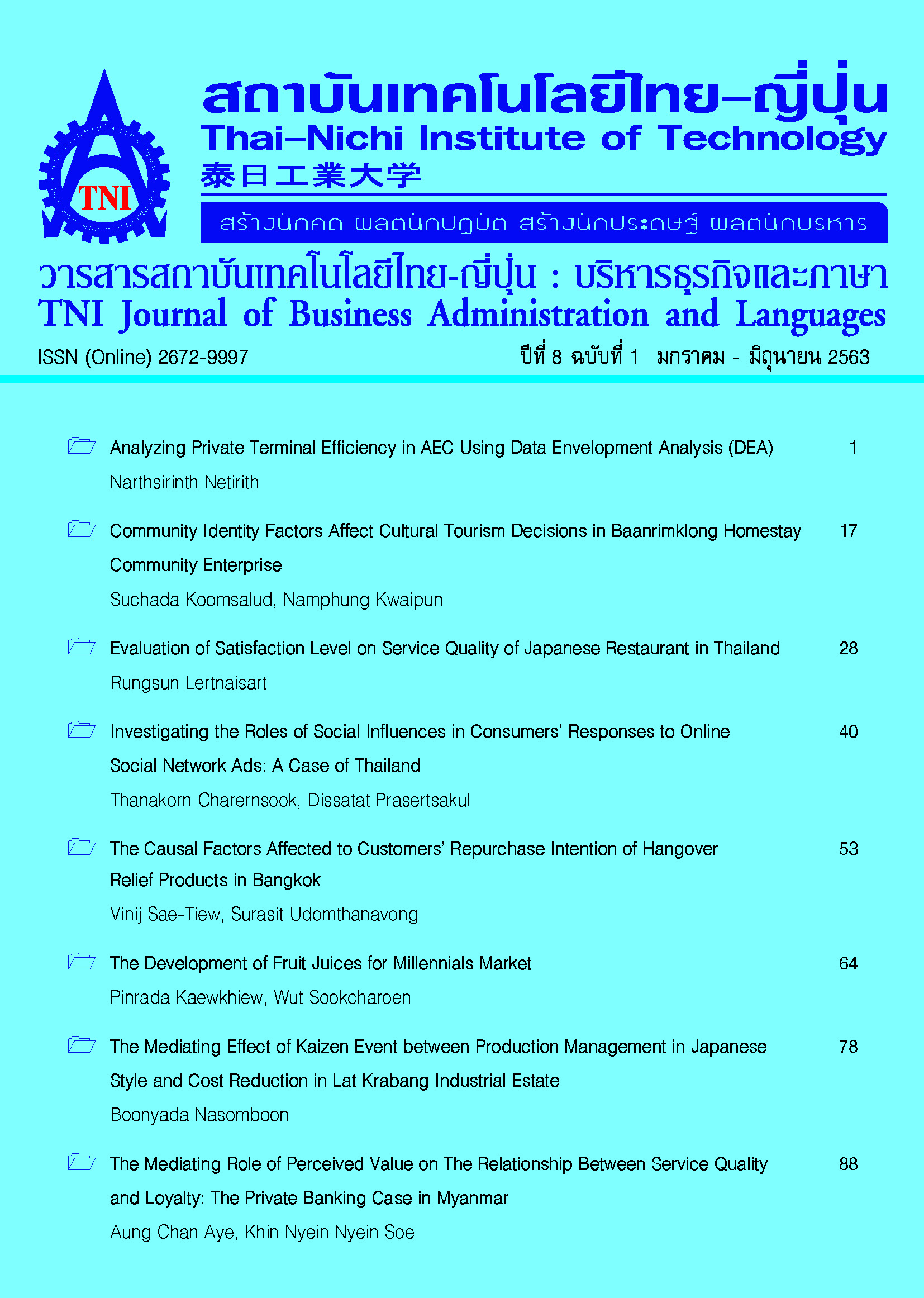The Development of Fruit Juices for Millennials Market
Main Article Content
Abstract
The purposes of this research are 1. to study factors that consumers choose fruit juices 2. To develop fruit juices for millennials market. Data were collected from a convenience sample of 400 millennial consumers. The statistics that used in this research include the frequency, percentage, mean, standard deviation, Independent t-test, and One-way ANOVA. The findings revealed that most of samples were female with the age of 17-37 years old (66.8 percent), drinking fruit juices less than 1 time per week (43 percent). The type of fruits that the millennial consumers want to drink were 100% genuine orange juice (85.8 percent). Other ingredients that need to be added to the juice were fruit pulp. The packaging should be a paper box, size 200-350 ml (38.8 percent). The price of juices should be between 20-29 baht (44.5 percent). The suitable retail locations were convenience stores (81.3 percent). The results also showed that there was a difference between personal factors in term of sex and behavioral factors in term of frequency of drinking juice regarding the factors that consumers choose fruit juices at significant level of 0.05.
Article Details
Article Accepting Policy
The editorial board of Thai-Nichi Institute of Technology is pleased to receive articles from lecturers and experts in the fields of business administration, languages, engineering and technology written in Thai or English. The academic work submitted for publication must not be published in any other publication before and must not be under consideration of other journal submissions. Therefore, those interested in participating in the dissemination of work and knowledge can submit their article to the editorial board for further submission to the screening committee to consider publishing in the journal. The articles that can be published include solely research articles. Interested persons can prepare their articles by reviewing recommendations for article authors.
Copyright infringement is solely the responsibility of the author(s) of the article. Articles that have been published must be screened and reviewed for quality from qualified experts approved by the editorial board.
The text that appears within each article published in this research journal is a personal opinion of each author, nothing related to Thai-Nichi Institute of Technology, and other faculty members in the institution in any way. Responsibilities and accuracy for the content of each article are owned by each author. If there is any mistake, each author will be responsible for his/her own article(s).
The editorial board reserves the right not to bring any content, views or comments of articles in the Journal of Thai-Nichi Institute of Technology to publish before receiving permission from the authorized author(s) in writing. The published work is the copyright of the Journal of Thai-Nichi Institute of Technology.
References
Bawornbundit, W. and Sangayothin, T. (2017). The development of Juntarok Mangosteen juice product and packaging, Thasala District, Chanthaburi. (In Thai). (Master’s thesis, Burapha University). Retrieved from http://www.ex-mba.buu.ac.th/ACADEMIC/Poster2015/poster133.pdf
Bundechanan, N. and Fongsuwan, W. (2017). Thai generation Y/millennial consumer health and wellness: An antioxidant beverage SEM analysis. Asia-Pacific Social Science Review, 16(3), 83–95.
Cochran, W. G. (1977). Sampling techniques (3rd ed.). New York: John Wiley & Sons.
Food Intelligence Center Thailand. (2017). Naturally healthy beverages in Thailand. (In Thai). Retrieved from http://fic.nfi.or.th/upload/market_overview/Rep_Natural%20Healthy%20%20Bev_17.03.14.pdf
Kasikorn Research. (2019). Trend of healthy products creating business opportunity. (In Thai). Retrieved from https://www.kasikornbank.comth/business/sme/KSMEKnowledge/article/KSMEAnalysis/Documents/HealthyProduct.pdf
Kasikorn Research. (2017). The opportunity for healthy food. (In Thai). Retrieved from https://www.kasikornbank.com/th/business/KSMEKnowledge/article/KSMEAnalysis/Documents/HealthyFoodBusinessGrowth.pdf
Kotler, P. and Keller, K. L. (2012). Marketing management (14th ed). New Jersey: Prentice-Hall.
Mustaqimah, A., Hartoyo, H., & Nurmalina, R. (2019). Marketing mix effect towards customer satisfaction and loyalty: Case study of Rejuve cold-pressed drinks. Indonesian Journal of Business and Entrepreneurship (IJBE), 5(3), 310-320.
Rotphenphian, C. and Tilokavichai, V. (2017). Factors affecting consumer’s buying decisions of functional drink in Bangkok Metropolis. (In Thai). Proceedings of the National and International Graduate Research Conference 2017, Thailand, 1530-1539. Retrieved from https://gsbooks.gs.kku.ac.th/60/nigrc2017/pdf/HMP7.pdf
Schiffman, L. G., Kanuk, L. L. & Wisenblit, J. (2010). Consumer behavior (10th ed). New Jersey: Prentice-Hall.
Tiroksakulchai, R. (2016). Tetra Pak 100% juice index report. (In Thai). Retrieved from https://forbesthailand.com/news/marketingA2.html


